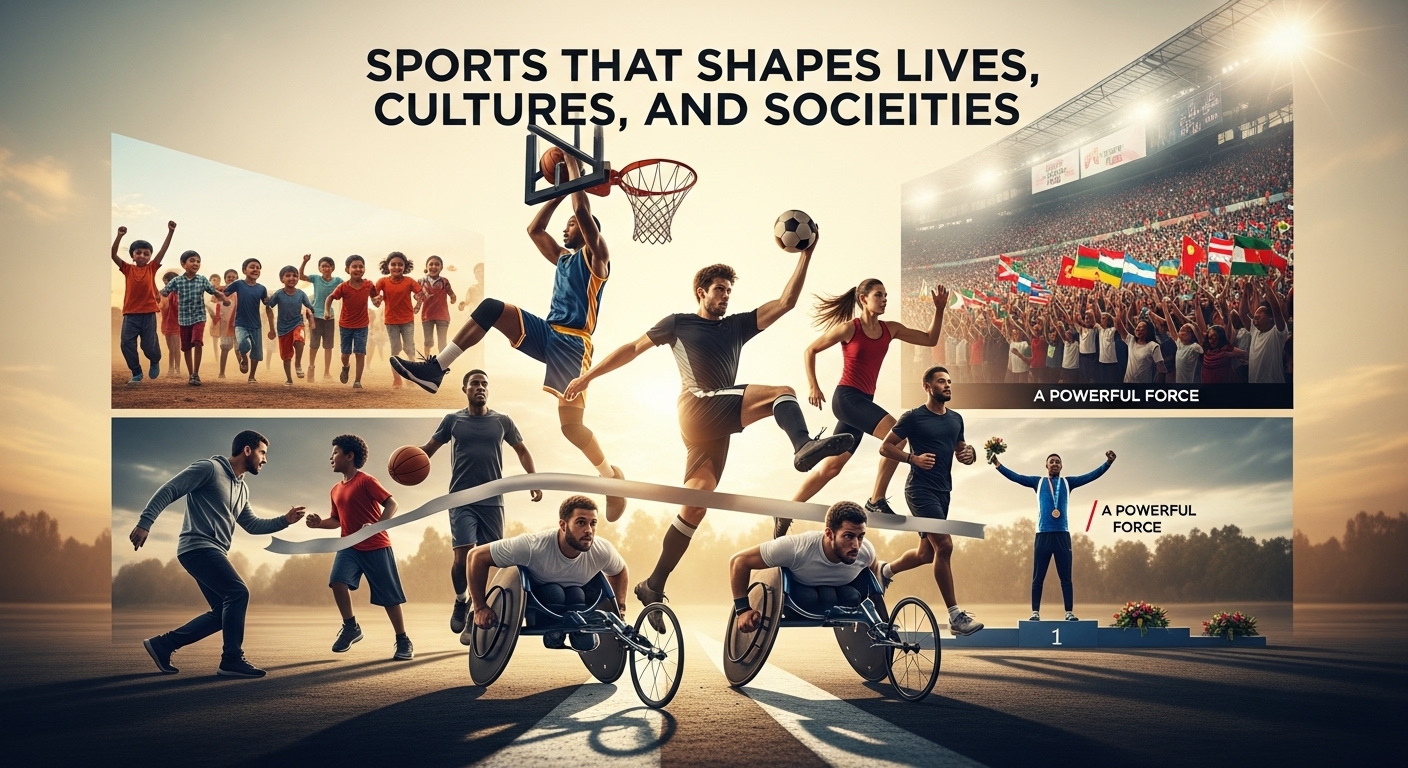Sports have been an integral part of human civilization for thousands of years. From ancient times when humans first competed in physical challenges to modern-day global events that captivate billions, sports have shaped societies, cultures, and personal lives. This comprehensive guide explores the multifaceted world of sports, including its history, types, physical and mental benefits, cultural significance, and its influence on society.
What Are Sports?
Sports are structured physical activities or games that usually involve competition, rules, and skill. They are designed to test strength, agility, speed, strategy, and endurance. While some sports are recreational and played for enjoyment, others are competitive and organized at local, national, or international levels. Sports are diverse, ranging from team sports like football and basketball to individual sports such as swimming and tennis.
At their core, sports are more than just games. They foster teamwork, discipline, perseverance, and respect. They also serve as a form of entertainment and a medium to build social connections.
The History of Sports
The history of sports is as old as human civilization itself. Evidence of organized games and competitions dates back to ancient civilizations. Sports were initially developed to train warriors and maintain physical fitness, but they gradually evolved into recreational activities and competitions for spectators.
Ancient Sports
The earliest records of sports can be traced back to ancient Egypt, where depictions of wrestling, archery, and swimming have been found on tomb walls. In ancient Greece, sports became a central part of culture and religion, culminating in the creation of the Olympic Games in 776 BCE. These games celebrated physical prowess, unity, and excellence. Events included running, javelin, discus, wrestling, and chariot racing.
In ancient Rome, sports often had a more violent undertone, with gladiatorial games and chariot races entertaining the masses. Similarly, in ancient China, sports such as archery and martial arts were integral to military training and social events.
Medieval Sports
During the Middle Ages, sports evolved further, often tied to feudal culture and traditions. Jousting, hunting, and archery were popular among nobility, while commoners engaged in games like football, wrestling, and folk dances that involved physical activity. These sports were less organized but played an essential role in community bonding.
Modern Sports
The modern era of sports began in the 19th century, particularly in Europe. Industrialization and urbanization led to more structured sports with standardized rules. Football, cricket, rugby, and tennis became organized with formal clubs, leagues, and international competitions. The revival of the modern Olympic Games in 1896 marked a significant milestone in global sports.
Today, sports are a multi-billion-dollar industry with professional leagues, international tournaments, and world-class athletes inspiring millions.
Types of Sports
Sports can be broadly categorized based on their nature, participation, and competition style. Understanding these types can help individuals choose activities that align with their interests and physical abilities.
Team Sports
Team sports involve a group of players working together to achieve a common goal. Communication, strategy, and collaboration are essential for success. Popular team sports include:
- Football: Played worldwide, football is a fast-paced game requiring skill, strategy, and teamwork.
- Basketball: Known for its agility and speed, basketball emphasizes coordination, precision, and teamwork.
- Cricket: A strategic sport with various formats, cricket requires patience, skill, and endurance.
- Volleyball: Team coordination, timing, and reflexes are crucial in volleyball.
- Hockey: Played on ice or grass, hockey demands speed, strength, and tactical awareness.
Individual Sports
Individual sports focus on personal performance and skill. Athletes compete against others or aim to beat their personal records. Some popular individual sports include:
- Tennis: A test of precision, agility, and stamina, tennis challenges players both mentally and physically.
- Swimming: Requires strength, technique, and endurance, swimming is both a competitive and recreational sport.
- Athletics: Track and field events such as running, jumping, and throwing showcase individual talent and determination.
- Golf: Focused on skill and strategy, golf emphasizes precision and concentration.
- Martial Arts: Sports like judo, karate, and taekwondo combine discipline, technique, and physical fitness.
Adventure and Extreme Sports
These sports focus on thrill, adrenaline, and exploration. They often require specialized equipment and training. Examples include:
- Rock Climbing: A sport that challenges strength, endurance, and problem-solving skills.
- Surfing: Combines balance, agility, and ocean knowledge.
- Skydiving: Provides extreme thrill and tests courage and control.
- Snowboarding: Requires precision, balance, and adaptability to changing terrains.
Indoor and Recreational Sports
Indoor sports are generally played in controlled environments, often as recreational activities. Examples include:
- Table Tennis: Enhances reflexes, coordination, and concentration.
- Badminton: A fast-paced sport that tests agility and stamina.
- Bowling: Combines skill, strategy, and precision.
- Chess: Though not physically intense, chess is a competitive mind sport.
Physical Benefits of Sports
Participating in sports provides numerous physical benefits, contributing to overall health and well-being.
Improves Cardiovascular Health
Engaging in sports like running, swimming, and cycling strengthens the heart, improves blood circulation, and reduces the risk of cardiovascular diseases.
Enhances Strength and Flexibility
Sports activities such as weightlifting, gymnastics, and martial arts develop muscular strength, endurance, and flexibility.
Promotes Weight Management
Regular participation in sports helps burn calories, maintain a healthy weight, and prevent obesity.
Boosts Immune System
Physical activity enhances immunity, helping the body fight infections and recover faster from illnesses.
Improves Coordination and Reflexes
Sports requiring hand-eye coordination, like tennis or badminton, enhance reflexes, precision, and agility.
Mental Benefits of Sports
Sports are not just about physical health; they also significantly impact mental and emotional well-being.
Reduces Stress and Anxiety
Exercise triggers the release of endorphins, the body’s natural mood elevators, which help reduce stress and anxiety.
Enhances Cognitive Function
Sports stimulate brain function, improving memory, concentration, and decision-making abilities.
Builds Discipline and Resilience
Regular practice and training instill discipline, patience, and resilience, essential traits for success in life.
Boosts Confidence and Self-Esteem
Achieving goals, winning competitions, or mastering a skill enhances confidence and self-esteem.
Encourages Social Interaction
Sports foster social connections, teamwork, and communication, promoting mental well-being and a sense of belonging.
Sports and Society
Sports have a profound impact on society, influencing culture, economics, and social dynamics.
Cultural Significance
Sports often reflect cultural values and traditions. For example, sumo wrestling in Japan and cricket in India are deeply rooted in cultural identity and heritage. Sporting events also serve as occasions for festivals, rituals, and celebrations.
Economic Impact
The sports industry generates massive revenue, creating jobs, boosting tourism, and promoting local businesses. Professional leagues, sponsorships, broadcasting rights, and merchandise sales contribute significantly to the economy.
Social Integration
Sports bring people together, transcending social, economic, and racial barriers. Community sports programs and international events like the Olympics promote inclusivity and cultural exchange.
Education and Youth Development
Sports play a crucial role in youth education, promoting physical fitness, teamwork, and character development. Schools and universities integrate sports into their curricula to foster holistic development.
Role in National Identity
Sports can unite nations, instilling pride and patriotism. International competitions like the FIFA World Cup or the Olympics inspire national pride and global recognition.
Famous Sports Events Around the World
Certain sports events have gained iconic status, attracting global audiences and shaping sports culture.
- The Olympic Games: Held every four years, the Olympics showcase the best athletes from around the world in a variety of sports.
- FIFA World Cup: Football fans worldwide eagerly anticipate this prestigious tournament that determines the world champion.
- Wimbledon: One of the most esteemed tennis tournaments, Wimbledon represents tradition, skill, and sportsmanship.
- Super Bowl: The championship game of American football, it is one of the most-watched sporting events globally.
- Tour de France: The world’s most famous cycling race, testing endurance and strategy over thousands of kilometers.
How to Get Started with Sports
Starting a sports journey requires dedication, planning, and consistency. Here are steps to begin:
Identify Your Interests
Choose a sport that aligns with your interests, lifestyle, and physical abilities.
Set Realistic Goals
Define short-term and long-term goals to track progress and stay motivated.
Invest in Proper Equipment
Ensure you have the right gear to prevent injuries and improve performance.
Seek Guidance
Consider joining clubs, hiring coaches, or taking classes to develop skills effectively.
Maintain Consistency
Regular practice and perseverance are key to improvement and enjoyment.
Focus on Nutrition and Recovery
A balanced diet and proper rest are essential to support physical activity and enhance performance.
Challenges in Sports
While sports offer numerous benefits, athletes and enthusiasts face challenges that can impact participation and performance.
Injuries
Sports-related injuries, such as sprains, fractures, and strains, are common. Proper training, equipment, and precautions can minimize risks.
Pressure and Stress
Competitive sports often involve immense pressure to perform, which can affect mental health.
Accessibility
Not everyone has equal access to sports facilities, training, and resources, leading to disparities in participation.
Doping and Ethics
Performance-enhancing drugs and unethical practices undermine fair play and the spirit of sportsmanship.
The Future of Sports
The landscape of sports is constantly evolving, influenced by technology, globalization, and changing societal trends.
Technological Advancements
Wearable devices, virtual reality, and analytics are revolutionizing training, performance tracking, and fan engagement.
Women in Sports
Increased visibility, sponsorship, and opportunities are empowering women athletes and promoting gender equality in sports.
E-Sports
Competitive video gaming is emerging as a legitimate sports genre, attracting global audiences and investment.
Sustainability
Sports organizations are increasingly focusing on eco-friendly practices, reducing carbon footprints, and promoting sustainable events.
Conclusion
Sports are more than just games; they are a reflection of human creativity, discipline, and passion. They promote physical health, mental well-being, social cohesion, and cultural identity. From ancient civilizations to modern arenas, sports continue to inspire, entertain, and unite people worldwide. Whether you are a casual player, a competitive athlete, or a passionate fan, the world of sports offers endless opportunities for growth, enjoyment, and connection.
Engaging in sports fosters not only a healthier body but also a stronger mind and a more vibrant community. The impact of sports on individuals and society is immeasurable, making it an essential part of life and culture. Embracing sports is embracing a journey of challenge, joy, and achievement.

